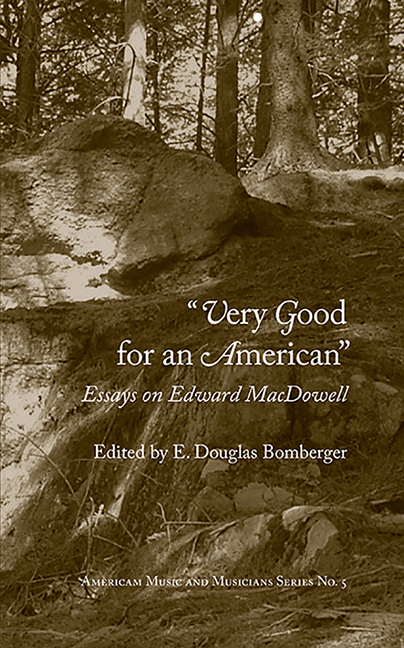Book contents
- Frontmatter
- Table of Contents
- Illustrations
- Contributors
- Acknowledgments
- Introduction: MacDowell at 150
- Edward MacDowell and the Society of Friends
- Historical Concerts in New York City, 1860-1876: An Approximation
- “No MacDowell, No Carreño”: Teresa Carreño's Contributions to the Dissemination of Edward MacDowell's Piano Music
- MacDowell, Liszt, and the Symphonic Tone Poem
- Wagnerian Influence and Motives in the Works of Edward MacDowell
- “On Sundays there was the music …” George Whitefield Chadwick between symphony and organ
- MacDowell vs. Butler: The “Idealist” Professor and the Administrator of “Materialism”
- Parallels in the Careers of Edward A. MacDowell and Chou Wen-chung
- American Bayreuth: The 1910 Peterborough Pageant and the Genesis of the MacDowell Colony
- Selective Bibliography
- Index
“No MacDowell, No Carreño”: Teresa Carreño's Contributions to the Dissemination of Edward MacDowell's Piano Music
- Frontmatter
- Table of Contents
- Illustrations
- Contributors
- Acknowledgments
- Introduction: MacDowell at 150
- Edward MacDowell and the Society of Friends
- Historical Concerts in New York City, 1860-1876: An Approximation
- “No MacDowell, No Carreño”: Teresa Carreño's Contributions to the Dissemination of Edward MacDowell's Piano Music
- MacDowell, Liszt, and the Symphonic Tone Poem
- Wagnerian Influence and Motives in the Works of Edward MacDowell
- “On Sundays there was the music …” George Whitefield Chadwick between symphony and organ
- MacDowell vs. Butler: The “Idealist” Professor and the Administrator of “Materialism”
- Parallels in the Careers of Edward A. MacDowell and Chou Wen-chung
- American Bayreuth: The 1910 Peterborough Pageant and the Genesis of the MacDowell Colony
- Selective Bibliography
- Index
Summary
On February 13, 1890 the virtuoso pianist Teresa Carreño performed the European premiere of MacDowell's First Piano Concerto with the Berlin Philharmonic under Gustav F. Kogel. The news of the event reached MacDowell in Boston a few days later through a letter from Carreño in which she wrote excitedly about their great achievement:
[A] big success you and I obtained last night and I want you to rejoice with me. Your concerto proved as heretofore as brilliant a success as can be wished for and I think I played more like a devil … than [like] an archangel. I was recalled amid cheers five times after it … I think we can feel proud. After the first movement the applause was like a storm, and … Kogel worked really to the best of his knowledge. After the Andante also a big sound of applause, and I tell you after the Finale, I thought the recalls would never cease. I had an immense house … and so you were heard by a large public of musicians and music lovers, as well as by all the critics.
The success of this performance proved to be very significant for both MacDowell and Carreño. It was an affirmative step in MacDowell's international recognition as a composer. At the same time, it was a triumphant new beginning for Carreño, who in midlife was determined to gain a place in Europe among the first-rank pianists. The idea of performing MacDowell's Concerto came from Carreño herself, who proposed the work for the last of her three debut concerts in Berlin. Her manager, Hermann Wolff, did not consider it appropriate to launch Carreño's career in Germany with an unknown work by an American composer. The conductor, afraid of the conservatism of the Berlin public, did not welcome it either. But after the success she had had in her two previous concerts in Berlin, the pianist was able to stand up for her convictions. Her answer to the conductor and the manager was “no MacDowell, no Carreño,” and she got her way and played MacDowell.
- Type
- Chapter
- Information
- Very Good for an AmericanEssays on Edward MacDowell, pp. 53 - 82Publisher: Boydell & BrewerPrint publication year: 2017

